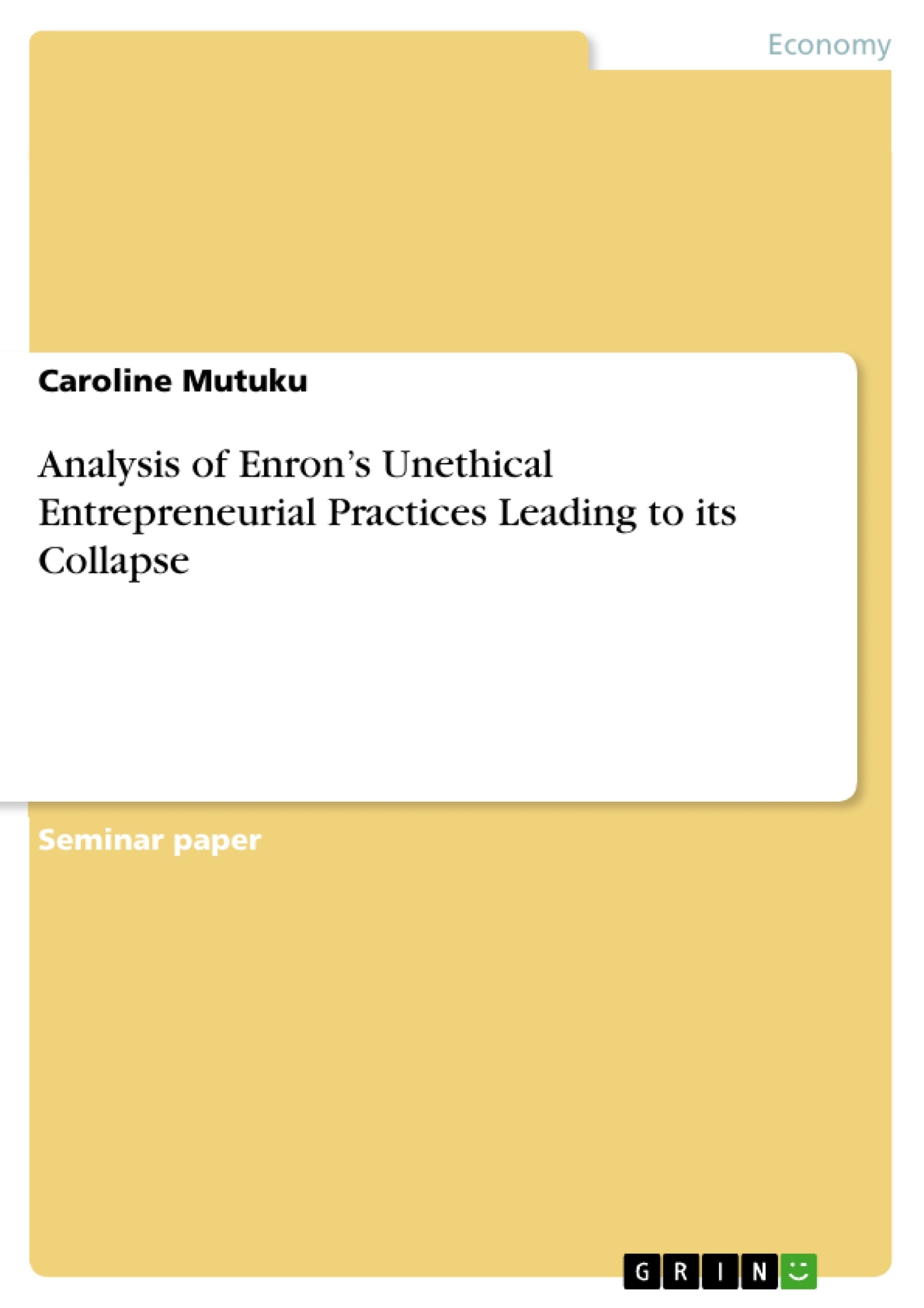Before 2000, Enron was famous in the business world. It was known as an innovative company, a technological powerhouse, and a major corporation with no fear. It was founded in 1985 as a natural gas pipeline company. The company emerged as a pioneer in the deregulated energy market rapidly, and within fifteen years, the enterprise had built various businesses in international energy-asset construction and energy trading.
From1990 to1998, Enron’s stocks appreciated by three hundred and eleven percent; however, the value of the stocks began to increase rapidly such that, by the end of 2000, Enron stocks were priced at eighty-three dollars, with a market capitalization in excess of sixty billion dollars. The company was rated in the Fortune magazine surveys of the most admired companies as the most innovative company. It, however, surprised many people with its spectacular fall within a year, and its image damaged forever. Its stocks price plummeted almost to zero.
Inhaltsverzeichnis (Table of Contents)
- Introduction
- Enron an Admired Company
- The Rise and fall of Enron
- Failure of Internal and External Check Balances
- Continuous Auditing
- Lessons Learnt from the Enron Case
- Alternative Evaluation
- Conclusion and Recommendations
- References
Zielsetzung und Themenschwerpunkte (Objectives and Key Themes)
This text examines the rise and fall of Enron, a once-respected energy company that collapsed due to unethical entrepreneurial practices and accounting fraud. The analysis aims to identify the key factors that contributed to Enron's demise, exploring the company's business model, accounting practices, and the role of internal and external controls.
- The impact of deregulation on the energy industry
- The role of accounting practices and financial reporting in corporate governance
- The importance of internal and external controls in preventing fraud
- The ethical considerations of corporate decision-making
- The consequences of corporate collapse for stakeholders
Zusammenfassung der Kapitel (Chapter Summaries)
- Introduction: This chapter provides an overview of Enron's history, its rise to prominence as a leading energy company, and its subsequent spectacular fall from grace. It highlights the contrast between Enron's early successes and its eventual collapse.
- Enron an Admired Company: This chapter delves into Enron's early years and the factors that contributed to its reputation as a successful and innovative company. It examines the company's expansion into various energy sectors and its impressive stock performance.
- The Rise and fall of Enron: This chapter focuses on the accounting practices and financial strategies that ultimately led to Enron's downfall. It examines the role of special purpose entities (SPEs), the use of mark-to-market accounting, and the impact of these practices on Enron's financial reporting.
- Failure of Internal and External Check Balances: This chapter explores the failure of internal and external controls at Enron, highlighting the role of auditors, regulators, and the board of directors in overseeing the company's financial activities. It analyzes the reasons why these controls failed to prevent the accounting fraud.
- Continuous Auditing: This chapter examines the potential benefits of continuous auditing in detecting accounting irregularities. It explores the advantages of using online technology and real-time monitoring to provide ongoing assurance of financial processes.
Schlüsselwörter (Keywords)
The main focus of this text lies on the unethical entrepreneurial practices, corporate governance failures, and accounting fraud that led to Enron's collapse. Key terms include special purpose entities (SPEs), mark-to-market accounting, continuous auditing, corporate social responsibility, and the role of auditors and regulators in preventing financial misconduct.
Frequently Asked Questions
What caused the collapse of Enron?
Enron's collapse was primarily caused by unethical entrepreneurial practices, systemic accounting fraud, and the failure of internal and external check balances.
What were Special Purpose Entities (SPEs) in the Enron case?
Enron used SPEs to hide massive debts and inflate profits, keeping these liabilities off the company's main financial balance sheets to deceive investors.
What is mark-to-market accounting?
It is an accounting method that records the value of an asset based on its current market price. Enron exploited this to book projected future profits as immediate revenue, even if those profits never materialized.
Why did the auditors and regulators fail to stop Enron?
The failure was due to a lack of independence, inadequate oversight by the board of directors, and the inability of external auditors to challenge the complex and fraudulent financial structures.
What lessons can be learned from Enron's demise?
Key lessons include the necessity of ethical corporate governance, the importance of transparent financial reporting, and the potential benefits of continuous auditing through modern technology.
- Citar trabajo
- Caroline Mutuku (Autor), 2018, Analysis of Enron’s Unethical Entrepreneurial Practices Leading to its Collapse, Múnich, GRIN Verlag, https://www.grin.com/document/426909



